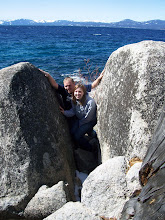I could only imagine what some of the older lawyers and judges said when social media started to become a popular avenue for expressing people's thoughts. It has created a large portion of work, not to mention the rules and standards are still being written. In an article titled, "How Social Media Is Pushing the Limits of Legal Ethics"they go through several examples of social media being used in legal situations. The article varies from jurors tweeting while doing their juror duty to jurors being chosen through Facebook and they even discuss if a Foursquare check-in will work as an alibi or as proof that you were at a disclosed place at a certain time.
An interesting fact that I stumbled upon while reading articles on this subject was the widening of the intergenerational gap. Here is a quote explaining this idea.
"The last 2 decades, in particular, have been characterized by exponential advances in technology, especially by personal access to ever more sophisticated electronic devices for information retrieval and communication. Concomitant changes in cultural mores relative to the use of such devices have widened the intergenerational gap, affecting all institutions, including law and education." (http://www.medscape.com/viewarticle/736430)
One thing is for certain, as social media changes the rules, laws, and ethics surrounding it will also change. It will be interesting to look back at cases that go all the way through the supreme court and see rulings that have dealt with social media and the laws of the First Amendment.
Showing posts with label Social Media. Show all posts
Showing posts with label Social Media. Show all posts
Tuesday, November 15, 2011
Monday, September 5, 2011
The Big Seven
How Twitter has influenced the sporting industry.
It used to be the post game press conference, or the emotional meltdown in front of a group of media that got professional athletes in trouble with their team or league. Now, a simple tweet with less than 140 characters can result in fines, suspensions and in some cases get you traded to another team. Twitter has stormed the sporting industry with every major sporting news and sports team, both professional and collegiate, have what is called a Twitter handle. It is really quite simple, pick a username and put an @ symbol in front of it.
The good part about Twitter for these athletes is that they can reach and relay their information to their fans in a quite simple fashion from the phone or laptop. The problem, they can send a message that deters fans and angers followers. However, sports psychologists have studied the way fans react and use twitter with their favorite sport teams and players. What they have found is that even though Twitter is not a personal connection between two people, the fan in most cases feels as though they had a personal relationship with those they follow. Is it imagined, well yes? Most of the time you are not going to be “mentioned” or “direct messaged” from your sports hero, but maybe they will retweet something you have said, and all of a sudden you feel like you are friends with them.
Overall, Twitter is helping the sporting industry in marketing, advertising and branding. “Twitter satisfies fans’ thirst for a closer connection to big-time athletes, many of whom are overpackaged and overmanaged in their quest for marketing cash. There’s also the way Twitter, which has become the fastest-growing major Web site in the U.S., peels back the curtain on an athlete’s existence, showcasing personality layers never seen at press conference.”
All information and citing in this blog post were taken from http://sportsillustrated.cnn.com/2009/writers/the_bonus/06/05/twitter.sports/index.html?eref=sihpT1.
Facebook and Collegiate Sports
It used to be the post game press conferences and interviews with the media that kept Athletic Departments at most colleges in the U.S. worrying about what their athletes were going to say. Now, in just a few seconds an athlete can post something on Facebook or post a picture that can open a can of worms with more problems than anyone could have imagined.
In fact, many colleges have demanded that their athletes not use sites like Facebook, because of the risk involved. Fred Stutzman, a student from North Carolina, was involved in a study about this topic and said “"Athletic departments are probably more concerned about old media — what athletes say to the press after games," Stutzman says. "But I think there is the potential here for athletic departments to get blindsided."
Controlling and policing athletes has become an ever-growing task that has brought up many questions about First Ammendment rights of students. “Kermit L. Hall, president of the University at Albany (N.Y.) and an authority on campus free-speech issues, thinks schools are probably on safe ground restricting athletes, though probably not other students. (His school does not impose restrictions on Facebook.)”
Social media continues to change and likewise those who allow their institutions and athletes to use such sites will have to adapt and change in order to protect the athletes and the ogranizations.
All information and citing in this blog post were taken from http://www.usatoday.com/tech/news/internetprivacy/2006-03-08-athletes-websites_x.htm.
Subscribe to:
Posts (Atom)

